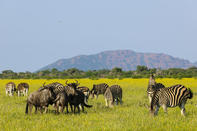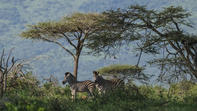Known Associates

Zebra are well known for the fact that they eat grass in open country where they can keep an eye out for predators. They have excellent senses of smell, sight and hearing. Zebra prefer shorter, green grass such as that which flushes after a fire or the first rains but they do also readily take tall coarse growth.
Taller grass is cropped and made more suitable for the foraging habits of blue wildebeest and other antelope in a process known as grassland succession. Wildebeest prefer very short grass and are often found in association with zebra for this reason and to benefit from their excellent vigilance. Zebra have black muzzles equipped with a strong movable upper lip. They use the upper lip to push grass between their incisors and then snip it off.
Gaseous Digestion

Zebra are hind-gut fermenters. Lacking the four-chambered stomach of a ruminant, zebra pile all their often fibrous food into one gut, which digests via fermentation. The breakdown of cellulose is less effective than with a ruminant but they can digest larger amounts of food faster.
Large quantities of gas are released as a by-product and this inflates their bellies so that they always look fat and healthy. It is also the cause of the flatulence experienced when zebra take fright and run away. Because even sick and weak zebra appear fat due to their gaseous digestive process, the most reliable way of determining the health of zebra is by looking at its mane on its neck. Usually, the short hair stands erect but under stress, this will flop over.
Bulk Feeders

Zebra are unselective bulk feeders. Eating a lot of fibre means that they require a regular supply of water to facilitate digestion. Zebra must drink daily and are seldom further than 10 km from water. They are fussy drinkers preferring clean water and in this regard, they may scrape a hole next to a waterhole and allow clean water to filter through before they drink or they may carefully skim cleaner water off the surface.
Their reliance on water is the driving force behind zebra migrating when supplies are inadequate. Since they must move to find water (and good grazing), they are not territorial and different groups will aggregate together in favourable areas.
Even though zebra are strictly grazers, they have been known to browse occasionally most probably at the hardest times of the year when there is little else. They also dig up the rhizomes (underground stems) of grasses that are often more succulent than the above-ground parts, particularly in winter.
By Megan Emmett